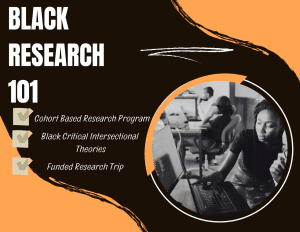
Applications for a cohort-based program will open in the Fall 2023 semester at The University of New Mexico for students interested in research with Black communities.
Black Research 101 was developed by Celine Ayala, a doctoral student in the Department of Sociology, in her position as project assistant in African American Student Services (AASS). Ayala, whose own research focuses on race, ethnicity, diasporic Blackness and intersectional discourse, was given the opportunity at AASS to create programming focusing on undergraduate research for the students who use AASS, as well as undergraduate students campus-wide.
 “I loved the idea of a cohort-based program but I wanted to do something more culturally relevant for the students we serve, as well as students who may be interested in research with Black communities. So, I started brainstorming with the African American Student Services staff and came up with Black Research 101 for students interested in research with Black communities̶, specifically using Black and Africana feminist methods,” she said.
“I loved the idea of a cohort-based program but I wanted to do something more culturally relevant for the students we serve, as well as students who may be interested in research with Black communities. So, I started brainstorming with the African American Student Services staff and came up with Black Research 101 for students interested in research with Black communities̶, specifically using Black and Africana feminist methods,” she said.
Ayala modeled the curriculum after El Puente Research Fellowship, a program under El Centro de la Raza, which supports and promotes undergraduate research in multiple academic areas. As in the El Puente program, Black Research 101 helps students gain basic knowledge on qualitative research methodology and allows them to build research experience to ultimately prepare them for graduate school and/or research-based job opportunities.
Students who are accepted into Black Research 101 will have the opportunity to develop their own research projects that focus on working with Black communities by using the tools and skills they learned in the workshops. Workshops cover a wide range of topics such as Black theoretical approaches, understanding the importance of history in research, developing a strong research question, how to develop a good research proposal, presenting research, Black methodologies, and coding and organizing data.
The program also includes a research trip. This spring Black Research 101 students will go to South Carolina to tour the new International African American Museum where they can learn a wide range of Black history through interactive exhibits and guided tours. Students will also be given the opportunity to tour various other historical sites in South Carolina to have an immersive educational experience of U.S. Black History.
“Black and Africana feminist theories put the experiences of Black women at the center of knowledge production and asks audiences to understand the world through the lens of Black women,” Ayala explained. Doing so allows individuals to understand the impacts history and large systems of oppression have on personal experiences, and also for an intersectional understanding of the world.
“Black and Africana feminist theories privilege the use of Black scholarship created by Black scholars to understand Black communities. Black and Africana feminist theories also acknowledge the expertise of the everyday intellectual such poets, artists, musicians, and literary authors,” Ayala said, adding that notable scholars include Patricia Hill Collins, bell hooks, Mignon Moore, The Combahee River Collective, Audre Lorde, Sylvia Wynter, Assata Zerai, Yomaira Figueroa-Vasquez, and Oyèrónkẹ́ Oyěwùmí.
Ayala noted that undergraduate research method courses often do not provide students with an in-depth exposure to Black and Africana feminist methods and epistemologies (or ways of knowing). Joining Black Research 101 will expose students to a wealth of knowledge that many are otherwise unable to obtain at the undergraduate level.
“I would encourage anyone who is interested in doing research with Black communities to join the program so that they may receive the proper methodological tools for a successful research project. Participation in Black Research 101 also allows students to attend a funded research trip where they will be able to learn diasporic Black history in prominent historical locations,” she said.
Ayala encourages students to apply from all majors across campus and research experience is not a requirement. Applications for the next cohort of Black Research 101 students open up in the Fall of 2023. For more information, email the AASS.
